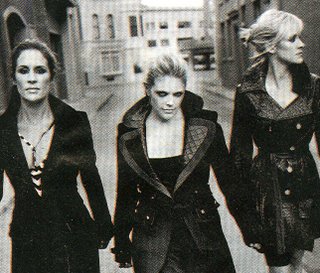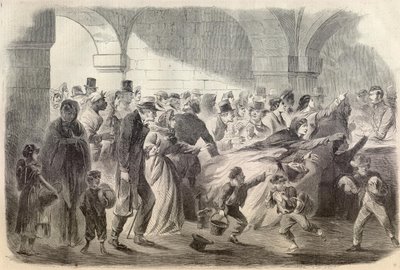

My Favorite Gangstas: Natalie Maines and P!nk
Why are Natalie Maines and Pink my favorite gangstas? That’s the question, but not the way it sounds. The interesting thing is why them? Why now?
But I suppose we need to get past the qualifying round before going on. I’ve thought Natalie, Emily and Martie belonged in the company with Ice Cube and Scarface at least since their unrepentant murder fantasy, “Goodbye Earl,” which came out about 6 months before Pink began spittin’ tough guy lyrics like “Hell Wit You” and “There You Go.” And 6 years later, it’s not just Natalie who’s “Not Ready to Make Nice,” Pink starts her new album laying into virtually all of her peers with “Stupid Girls” before turning on “Dear Mr. President.”
Now, considering their penchant for blond Mohawks, you might think I’d wanna call these two singers punks. But punks just don’t cut it. Punks think too small. (I may make an exception for Joe Strummer here who, at his crucial taking-on-the-American-pop-charts moment, also sported a Mohawk.) Punks, with their nihilism at one end of the spectrum and anarchist utopianism at the other, never really grapple with reality on a grand scale.
That’s the job for gangstas. For me, an unrepentant gangsta fan since NWA changed the way I saw everything almost two decades ago, the best gangstas (why bother with the crappy in any genre?) are the ones asking the big questions in pop music. Sure, they may not have the politically correct answers, but they keep their eyes and ears on the material reality. Not ready to make nice, the gangsta asks, how do we take over? The whole genre is a critique of capitalism in some sense, and it’s often a call for class unity and peace by focusing on the everyday violence of the status quo.
That’s what’s in Maine’s voice when she declares, “I could never follow” or I “wouldn’t kiss all the asses that they told me to” or “I’m not ready to back down ‘cause I’m mad as hell.” And that’s what’s on Pink’s mind when she declares “we’re not dumb and we’re not blind.” A big part of both artists’ strength lies where some would see a weakness—in a sort of vulgar directness (Pink takes home the trophy here). That’s precisely what makes gangsta such an appropriate comparison. When those who don’t "get it" get over being polite about human slaughter, then we will have made some progress.
There are a number of intriguing connections between the Dixie Chicks’ and Pink’s new albums. They tackle similar themes with songs like the DC’s “The Long Way Around” and Pink’s “Long Way to Happy” and “Everybody Knows” and “Nobody Knows” (which both focus on the singers’ refusal to let the world see them cry) and, among other things, they both sing lullabies (of a sort) here and end their albums with something like prayers—not worshipful prayers but pleas to the universe.
But what started this whole line of thinking was the way they each confront this political moment with an unusual variation on a staple of women’s music in the rock and soul era. It’s a form I like to think of as the Sunday morning reckoning song. On one level, that image comes from the idea of, say, Aretha Franklin singing “Think” or “Respect” to her man while she’s trying to decide whether to finish frying breakfast eggs in that iron skillet or use the whole damn thing, sputtering eggs and all, to lay him out if he won’t do right. On another level, I imagine it like Aaliyah’s “4 Page Letter,” written to simply sort a relationship out, whether or not the addresse ever gets the chance to read it (a practice about half of my women writing students have testified to ever since I first started teaching).
What's unusual is not the political dimension of these songs. All Sunday morning reckoning songs have a political tenor that rises above the vehicle. The politics of the bedroom generally serve as a metaphor for the larger society, particularly in women's music. But what's unusual about these two songs is the futility of the plea, on one level, and its hopefulness on another.
With Maines the open letter is aimed at an industry (a society really) that propagandizes real world hatred and war without offering a critical thinker enough rationale to justify murder. The result? Well, one is people threatening to assassinate her for saying she’s ashamed of the President. With Pink, the letter is aimed directly at the President, reckoning with grieving mothers, imprisoned fathers and children as collateral damage both here and abroad. In neither case is there any hope that the villains will listen, but the swelling music declares a great hope for unity among a much larger group who could.
It is a piece of Pink’s reckoning song, the bridge, that I see most clearly as a duet with Maines. Together, they could declare--cast iron skillet or gun drawn and ready—
“Let me tell you ‘bout hard work
Minimum wage with a baby on the way
“Let me tell you ‘bout hard work
Rebuilding your house after the bombs took them away
“Let me tell you ‘bout hard work
Building a bed out of a cardboard box
“Let me tell you ‘bout hard work—
You don’t know nothing ‘bout hard work!!!!!!!”
Fear of this sort of rallying cry is one reason Democrat and Republican politicians who have been hawkish on this war (almost all of them, but for the sake of clarity let’s single out Hillary Clinton, Rick Santorum, Joe Lieberman, for instance) have joined hands against youth culture. The only way you blame music and videos for kids thinking of violence (when your job as Senator is to propagandize violence) as a solution to problems is to ignore such ideas and their implications altogether.
Whether politicians aim at gangsta rap or gangsta video games is really immaterial. The gangstas raise their voices in crude, unrepentant ways because the stakes are too high to fret over manners or political correctness, and perhaps manners are being revealed for what they really are, a systematic tool for ignoring the “outcasts” Pink says she wants to hear.
She literally cries out for these outcasts every day (just about every hour) on Top 40 radio right now because, like all of the great gangstas, she thinks big. That’s what polite society—be it conservative or progressive—hates most of all, those who listen to and engage with the unwashed masses. Fortunately, the best gangstas like the Dixie Chicks and Pink dream of a world, as Maines sings in “I Hope,” where we “can all live more fearlessly.”
